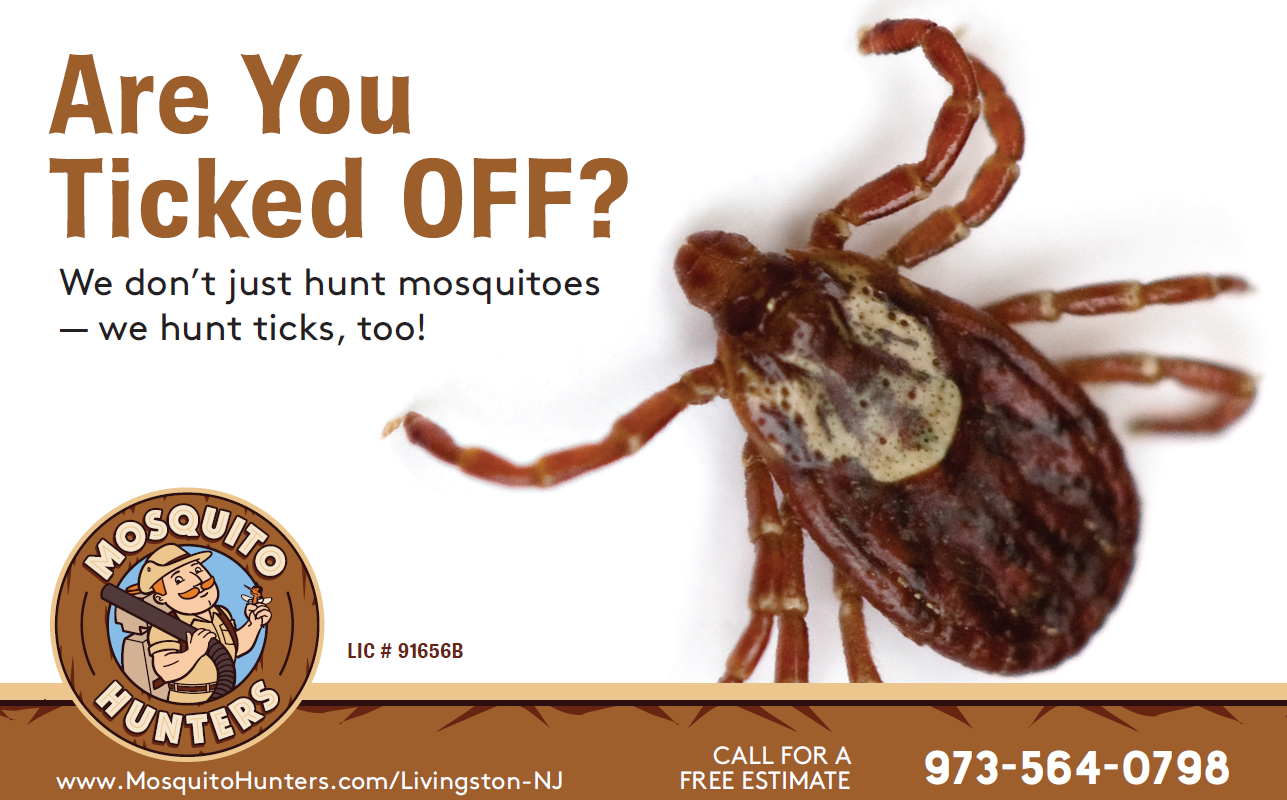
Tick Facts
Ticks: The Other Backyard Pests
At Mosquito Hunters of Suburban Essex, we treat more than just mosquitoes. Our philosophy is to work closely with our clients to both educate and identify trouble spots in your yard when it comes to both mosquito and tick control. The danger of ticks are not simply urban legends; did you know…
- There are nearly 100 species of ticks in the United States and almost 900 world-wide. Some of the most prevalent tick species in New Jersey include American dog ticks, brown dog ticks, blacklegged (deer) ticks, and lone star ticks.
- Like mosquitoes, ticks have 4 life stages: egg, larvae (infant), nymph (immature) and adult (mature). Unlike mosquitoes, depending on the breed, it can take up to 3 years for a tick to mature from nymph to adult stage.
- The blacklegged/deer tick lays their eggs in the spring and then they move onto the larva stage in the summer. Six to nine months later in the following spring season they evolve into the nymph stage, where they continue to evolve for the next six months until they are fully formed adults in the fall. Those adults then resume the cycle by laying a whole new batch of eggs in the spring two years after they themselves first emerged as eggs.
- Ticks are either hard or soft. Hard ticks are found in the woods while soft ticks (they actually have a tough leathery skin) are typically in caves, cabins and on birds.
- We all know that like a vampire, ticks feed on blood, but did you know that it typically takes 24-48 hours of feeding before they can successfully transmit diseases? (This is why it is so important to check your pets and children for ticks when they come back inside).
- Ticks range in size from a grain of sand to an apple seed, depending on which stage of the life cycle they are in and if they have already had a blood meal.
- Did you know that ticks have 4 pairs of legs and are actually classified as arachnids, not insects? This makes ticks more similar to spiders and scorpions!
- Deer get a bad rap as the largest transmitters of ticks. Ticks hangout in tall grasses and low brush, holding on with their hind legs while reaching out with their front ones to hitch a ride on passing animals or people, but the truth is, these parasitic predators are just as likely to grab or drop down onto unsuspecting small animals like mice, rabbits, chipmunks and squirrels. Ticks will also latch onto a person’s passing foot or leg and then crawl up to the head, neck and ears where the skin is thinner.
- Ticks like to burrow in dark areas 3-4 feet off the ground including tree bark, landscape retaining walls and cervices in wood and bricks.
- Dogs and outdoor cats are easy targets for ticks, but cats are constantly cleaning themselves. Dogs, on the other hand, especially those with long hair, are more susceptible to pick up one of these nasty pests that love to borrow into the skin under the long animal fur and feed there undetected for days.
- Ticks can transmit multiple diseases at the same time, including Lyme disease (most prevalent in the in the northeastern US—like New Jersey), Rocky Mountain Spotted Fever, Ehrlichiosis, Babesiosis and Anaplasmosis.
- The male tick usually dies after mating—at least he goes with a smile on his face!
- After a blood meal, the female tick is multiple times larger than its male counterpart and can lay 2000-18,000 eggs at a time!
- NEVER remove a tick with your bare hands and be very careful not to leave the head embedded in the skin. It is best to use a “tick key” or a pair of tweezers to gently remove the tick. Using Vaseline or other gels will not smother a tick; rather it will cause the tick to burrow into the skin even more.
- Ticks are not killed by freezing temperatures and can survive the winter in a dormant state. Some ticks will remain active until the ground is covered by snow.
- The blacklegged/deer tick lays their eggs in the spring and then they move onto the larva stage in the summer. Six to nine months later in the following spring season they evolve into the nymph stage, where they continue to evolve for the next six months until they are fully formed adults in the fall. Those adults then resume the cycle by laying a whole new batch of eggs in the spring.
Now that you know more than you ever wanted to know about ticks, you are probably either considering never leaving you house or wondering what you can do to protect your family and furry friends. Tick prevention is a multi-pronged approach and includes:
- Application of an acaricide by your friendly neighborhood professionally licensed Mosquito Hunters technician
- Removal of leaf debris
- Clearance of tall grass and brush
- Removal of trash, recycling and old furniture from the yard that ticks can hide in
- If possible, furniture and playground equipment should be kept away from the edge of the yard and trees.
- Consider placing a 3-foot gravel barrier between the lawn and wooded areas to limit tick migration.


 Erica G.
Erica G.